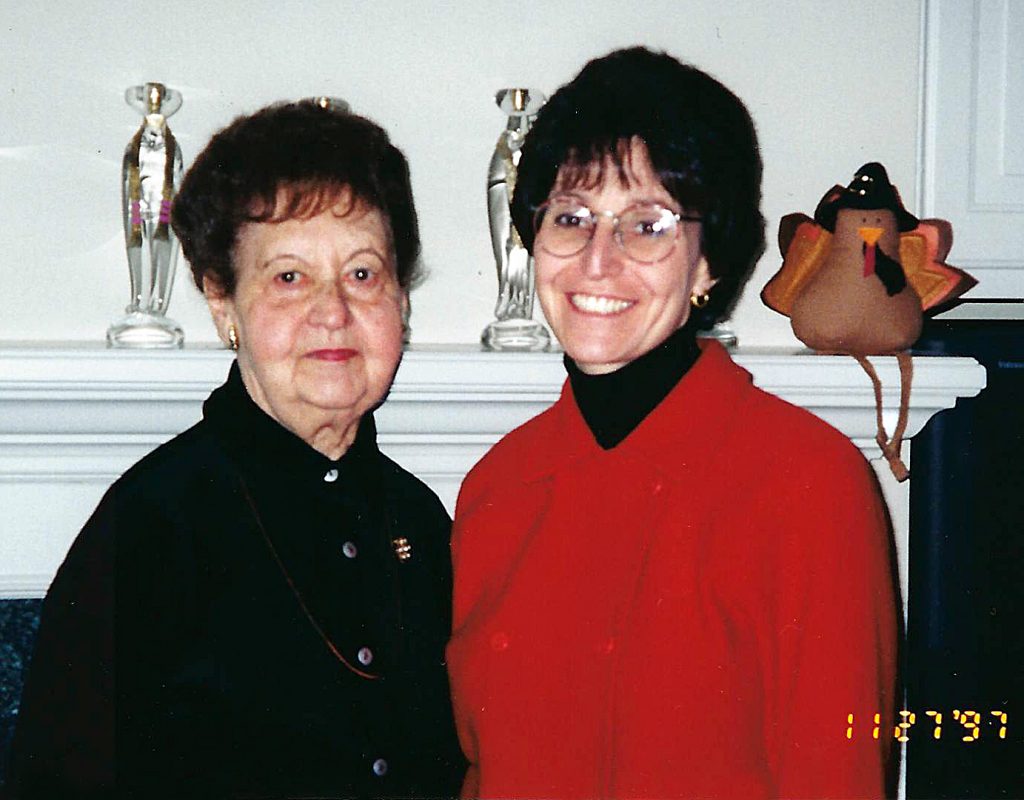For the past fifteen years, I have dreaded the end of daylight savings time. Sure, an extra hour of sleep is great, but I have a complicated set of memories attached to this time of year. Let me explain.
To the best of my recollection, it all started early in the morning on Sunday, October 31, 2004. In those days, just about every three weeks I would drive up to see my mother who was living in a nursing home in upstate New York. This was one of my weekends. Though it was hard to live so far away from her, my mother, who was 90 years old, was receiving wonderful care where she lived, especially from her favorite aide, April. Though her dementia was advancing, and she had grown reluctant to speak much at all, my mother was still able to read, and as a former reference librarian, the written word meant a great deal to her. In addition, up until this visit she had still recognized me, and my visits had always made her very happy. Until this visit, that is.

April paid close attention to details, and since she knew how important my visits had been to my mother, she came up with an idea that she was convinced would add to her joy on this particular weekend. That Saturday morning, April handed my mother a note that read, in large print, “YOUR DAUGHTER, BONNIE, IS COMING TO VISIT YOU TOMORROW.”
When I called that afternoon to remind the staff that I was coming, I was told that my mother had been clutching the paper in her hand all day and that every few minutes — and sometimes even more frequently — she would unfold the now-crumpled piece of paper, read it, and “fold” it back up and smile. She did this over and over again.
While my mother clutched and un-clutched the note announcing my visit, I got an extra hour of sleep in preparation for my drive, and that Sunday morning, I felt well-rested as I set out on my six-hour trip. As usual, I arrived right at the nursing home at 11:00 AM, with plans to stay until around 4:00 PM when I would begin my drive back. Unfortunately, my five-hour visit shrunk to just 30 minutes. Here’s what happened:
As I got off the elevator on the sixth floor, I bounded into my mother’s room with a grin and a “Hi Mom!” For the first time ever, I was greeted by utter confusion and consternation. My mother always kept her room on the dark side (she was NEVER one to waste electricity!) and so I figured she just couldn’t see me clearly. I turned some lights on and repeated in a clear, loud voice, “Hi Mom! Its Bonnie! I came to visit.”
I could see the tension mounting on my mother’s face, and even her body seemed to stiffen. She uncrumpled the paper that she was still holding in her hand, read it and vigorously shook her head as if disagreeing, over and over again. Since she had always recognized me up until now, I could not understand what was happening. I’m sure part of me knew but couldn’t yet believe that the inevitable moment had come — my mother no longer knew who I was—and I still remember the feeling in the pit of my stomach. Not only did my own mother not recognize me, but further, my presence was agitating her — and even more so after I announced myself once again. What was going on?
It took me a few minutes to think about this very new and very hard situation. Where was my mother? Why had this suddenly happened? When I finally took a look at the paper in her hand, I thought that I had understood the problem and that I knew just what to do to fix the situation. I breathed a sigh of momentary relief as I affirmed for my mother that I understood her confusion.
I explained that when April had written the note — the one that said I was coming tomorrow — it was yesterday so the tomorrow on the note IS today, so it really is me on the day that I was supposed to come. I think I had said something like this: “Oh, April wrote that yesterday so today IS tomorrow. So when it said Bonnie is coming tomorrow, that is today!” It made so much sense to me at the time — a quick and easy communication to fix the misunderstanding. But what was I thinking? I was explaining to someone with pretty advanced dementia that somehow today is tomorrow because of yesterday? The deeper problem was that we no longer spoke the same language.
By now you are probably wondering how it all ended. Here’s the quick and heartbreaking version: April felt terrible — she was just trying to help and writing a harmless note about my upcoming visit seemed like a good idea. I felt terrible because I was so overwhelmed by the thought of my mother not recognizing me for the first time that I just kept digging my hole deeper and deeper. Despite my best efforts to communicate, my words had actually made everything worse. And my mother? She ended up calming down after they asked me to leave, she took a nap, and the note, which had not been harmless at all, mysteriously disappeared.
But that’s just the point about words: we don’t always know which ones are going to help, and which are going to make things more complicated for a person living with dementia. We cannot always predict where our communications — even with our best intentions — will land.
I was thinking about this note and the entire incident a few weeks ago following one of our Dementia Friends Ohio sessions. During this event, one of our participants had told me how much she wished she had known the communication strategies we discussed when she had been caring for her husband with dementia. I surprised myself by taking her hand and telling her that I, too, wish I had known these strategies when I was caring for my mother. We both focused on the same two communication tips. The first one is to avoid criticizing or correcting. Don’t tell the person what he or she is saying is incorrect. Instead, listen and try to find the meaning in what is being said. And the second one is to avoid arguing. If the person says something you don’t agree with, let it be. Arguing only makes things worse and often increases agitation for the person with dementia.
Over some chocolate chip cookies and hot tea we looked together at our website, focusing on both the communications strategies section and the shorter communication quick tips, and then we watched one of our first new animated video clips on communication strategies for people living with dementia and their care partners. When the daughter on the video heard the advice “speak in clear, direct, and simple words,” this daughter heard it, too. Loud and clear. My mind wandered back to my painful experience all those years ago, and I was finally able to let go of my guilt. I realized I had done my best with what I knew — And April had as well. I didn’t have all of the guidance I have now. Communicating with people is hard when you speak the same language; communicating with people with dementia involves a constant reevaluation of that language, and that is no small task. What worked yesterday might not work today or tomorrow but I know I could have navigated these rough seas more ably if I had reviewed our materials back then!
I know this may seem like a really small incident and you are probably thinking, “for 15 years she worried about this?” But I think that is just the point. The little stuff really does matter. We each blame ourselves for so many things. Letting go of the blame is hard — and it actually took three different approaches to communication — the quick tips, the more detailed communication section of our website and finally the video clip — to get me over the hump. I sure am living our brand — no “one size fits all” for me!
You can learn more about the power of communication here on our website. Please take a look at our communications tips and give them a try. Look through the longer version for more in depth guidance and information. For those of you who are visual learners (like me), we are in the process of creating short animated videos. Check back, we will have them posted on our website soon. Remember, everyone is different; you won’t always hit a home run. But now you have some good information to get you started. And we are always here to answer any questions and provide more guidance as you need it. Please let us know how best we can be helpful. Some people want and need detail, some need “quick tips” and some, like me, seem to need visual and auditory clues. We hope we have uncovered an approach that works for you.
And this year, as we turned the clocks back, I no longer turned “MY” clock back 15 years. Instead, I looked ahead and felt incredibly thankful for the opportunity for all of us to work together on behalf of those impacted by dementia.
Bonnie


Bonnie, thanks for you well-written article……….you are an excellent communicator. Storytelling was a great vehicle to convey your message.
I,too, was overwhelmed with guilt when Mom died.
Family was always very important to Scott. I remember how eager he was to visit Marissa’s grandmother even though he knew she wouldn’t recognize Marissa.
PS. Kale looks just like your mom.